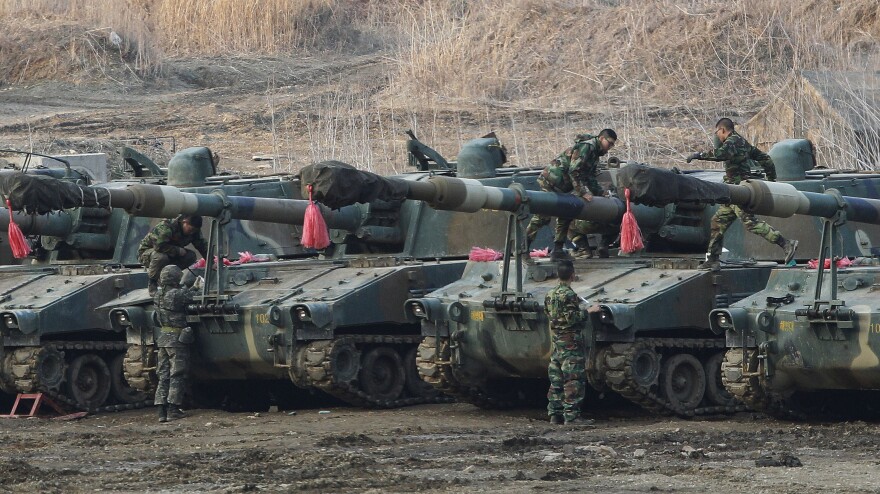North Korea has been a big headache for the United States, with the new leader there saying almost daily that his country is ready to go to war.
Speaking in Washington on Wednesday, Defense Secretary Chuck Hagel said the U.S. can't afford to dismiss that talk as bluster.
"It only takes being wrong once, and I don't want to be the secretary of defense who was wrong once, so we will continue to take these threats seriously," he said.
It's not just the developments in North Korea that have the Obama administration's attention these days. South Korea and Japan may be rethinking their defense policies as a result of the North Korean threats.
A Change In Attitude
South Korea's capital, Seoul, with a population of more than 10 million people, has for years been within easy shot of North Korea's vast artillery. For much of that time, the South Korean attitude has been: Do whatever is necessary to maintain peaceful relations.
Gen. Walter Sharp, who commanded U.S. forces in Korea until 2011, recalls the prevailing sentiment when he arrived.
"You talk to a South Korean, when I got over there in 2008, 'We just got to keep this calm. We don't want to challenge them too much.' And it was all because of where Seoul is, and the damage that could come with where North Korea has their artillery and all that."
South Koreans also didn't think North Korea would ever attack them. But Sharp says that attitude changed after North Korea sank a South Korean ship in March 2010 and then shelled a South Korean military base a few months later. The new feeling in South Korea was: We shouldn't take this anymore.
Now, with the new North Korean leader, Kim Jong Un, threatening nuclear strikes on South Korea, Japan, and the U.S., there is a new determination across the region to adopt a tougher line.
Sen. Bob Corker, R-Tenn., noticed that change in attitude last week on a visit to Japan and South Korea.
"When you see this kind of activity, it puts pressure on other countries in the region as their populations themselves become concerned about an immature leader, 30 years old, being bellicose in this way and threatening that part of the world," he said.
Calls For Revisiting Civilian Nuclear Pact
There's talk now in Japan and South Korea that they should have nuclear weapons of their own, to match North Korea's threat. The U.S. opposes that. But now U.S. officials have another challenge to deal with: The South Korean government wants to renegotiate a civil nuclear accord with the U.S. to be able to reprocess spent nuclear fuel. Theoretically, it could set South Korea up to make nuclear weapons of its own.
Corker said every leader he met with in Seoul pressed him on the reprocessing issue.
"They say it's for civilian purposes only, that there's a technique that they'll be using that would not allow these to be turned into nuclear weapons, but in the backdrop of this, again the president is not in any way pushing for this, but the population is becoming more oriented that way," he said.
U.S. officials have long resisted South Korea's request for reprocessing permission. Some U.S. analysts say they suspect the South Koreans may actually want to be positioned to build nuclear weapons.
William Tobey, who worked on nonproliferation issues in the George W. Bush administration, says he's not convinced by the South Koreans' arguments — that reprocessing nuclear fuel makes sense for economic and energy reasons.
"I wouldn't question South Korean motives," he said. "On the other hand, as you go through the arguments that have been advanced in favor of reprocessing, it's really possible to knock them down one by one."
U.S. officials have been reassuring the South Koreans that the United States will protect them and have pointed out that allowing South Korea to reprocess spent nuclear fuel might prompt less reliable countries to demand the same rights. But with North Korea's leader swearing each day that he's ready to launch a nuclear war, those U.S assurances don't carry as much weight as they otherwise might.
Copyright 2022 NPR. To see more, visit https://www.npr.org.



